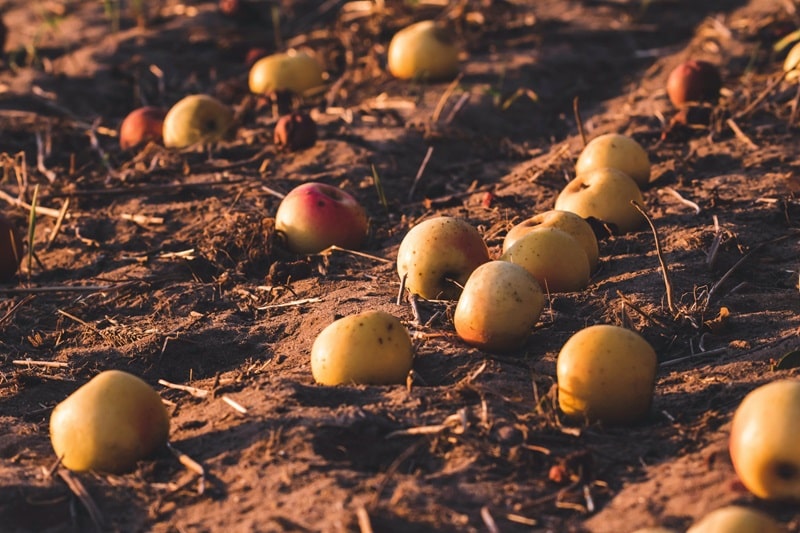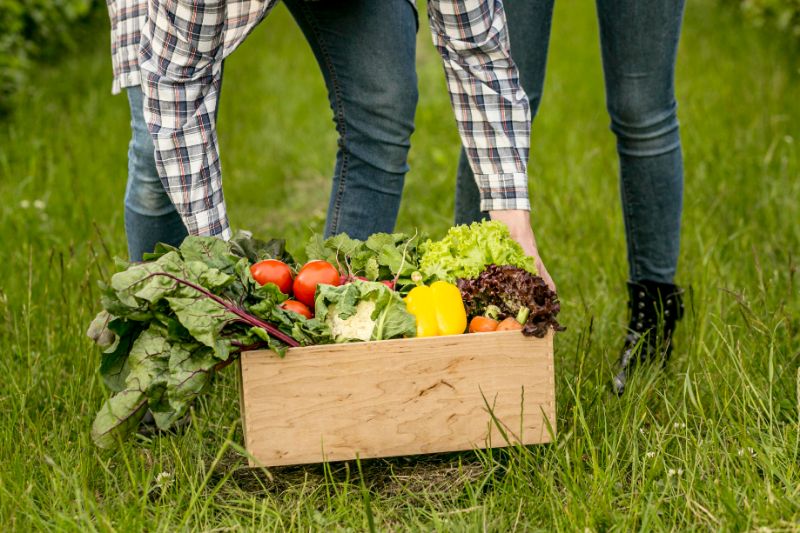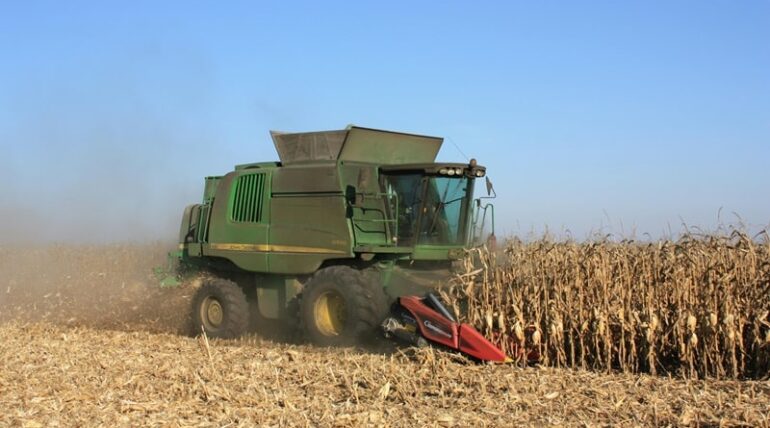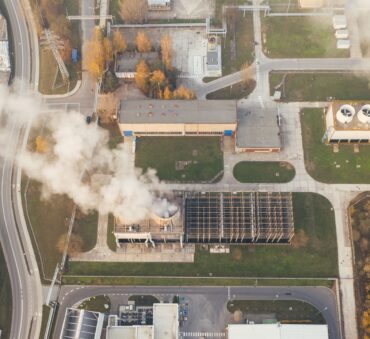Food waste has become an increasingly concerning issue in the United States, sparking widespread discussions over its effects, a rise in sustainability efforts, and the emergence of innovative strategies for reducing waste at different stages of the supply chain.
Food waste on farms is a particularly growing concern, with improper farming techniques, a lack of proper infrastructure, and high quality standards all contributing to the issue. With about 16% of U.S. food waste occurring on farms, food waste statistics highlight the need for an increase in sustainable agriculture and farming practices.
Keep reading to dive into the topic of earth-friendly farming, where we’ll explore sustainable farming techniques, strategies to reduce food waste at the farm level, and potential challenges.
Key Takeaways
- Sustainable farming involves farming practices designed to protect the environment, increase natural resources, and make the best use of non-renewable resources, creating a farming system that is viable in the long term.
- Sustainable agriculture and farming methods include crop rotation and diversification, conservation tillage, agroforestry, cover cropping, and water management techniques, among others.
- New advanced technologies are becoming increasingly adopted in the food production industry due to their ability to reduce, manage, and treat food waste. This includes technologies like IoT, drones, artificial intelligence, and data analytics.
- Sustainable farming methods offer many benefits, including improved soil health, water conservation, biodiversity, climate mitigation, reduced food waste, and enhanced food security.
Causes of Food Waste in Farming
Common causes of food waste on farms include:
- Inadequate storage facilities: Storage facilities that don’t have proper temperature and humidity control lead to premature spoilage and deterioration of products.
- Overproduction: There are multiple reasons that overproduction causes food waste, such as inaccurate demand forecasting, strict grading and sorting processes, market pressures, and government initiatives that encourage excess production.
- Inefficiencies in harvesting techniques: Harvesting crops too late or early, labor shortages, improper machinery, and poor post-harvest handling all contribute to waste at the farm level.
- Consumer preferences for visually perfect produce: Due to high aesthetic standards, strict grading and sorting processes cause farmers to discard produce with blemishes or distinct shapes and sizes, leading to ugly produce contributing to food waste.
- Pests and diseases: Every year, up to 40 percent of crops are lost due to plant pests and diseases, making it a huge issue in the agricultural industry.
- Market access issues: Small-scale farmers may lack access to profitable markets, leading to excess produce that spoils before it can be sold.

What is Sustainable Farming?
Sustainable farming involves farming practices designed to protect the environment, increase natural resources, and make the best use of non-renewable resources. The overall goal is to create a farming system that is viable in the long term, working to balance the needs of the present without compromising the ability of future generations to meet their own needs.
There are multiple sustainable farming methods that work to improve environmental health, economic profitability, and social and economic equity, including organic farming, regenerative agriculture, and permaculture.
Organic Farming
Organic farming is an agricultural production method in which food is grown and processed without the use of synthetic fertilizers or pesticides. By relying on natural substances and processes, organic farming reduces the negative effects of pesticides, improves soil health, enhances biodiversity, and reduces chemical runoff.
When properly performed, these practices can lead to better crop management, which in turn reduces waste. While there are multiple strategies that can be implemented, crop rotation, composting, and biological pest control are all valuable tools for reaching sustainability goals. Of these, composting has proven to be an especially popular approach, as it recycles organic waste back into the soil, increases plant growth and health, and reduces greenhouse gas emissions.
Regenerative Agriculture
Regenerative agriculture is a holistic approach to farming and land management that seeks to restore and enhance the health and biodiversity of ecosystems. Key practices, such as cover cropping, no-till farming, and agroforestry, work in harmony with nature to improve soil health, increase biodiversity, and enhance water retention. These practices lead to the production of more resilient crops that are less likely to be wasted, therefore acting as a valuable approach to sustainability efforts.
A great example of how this is applied in the real world is General Mills, a U.S.-based company that aims to advance regenerative agriculture on 1 million acres of farmland by 2030. Their program consists of education workshops, technical support, and collective research, demonstrating that farms do not necessarily need to use conventional methods to produce the highest yields.
Permaculture
Permaculture is an approach to land management that seeks to create sustainable and self-sufficient agricultural systems by mimicking the patterns and relationships found in natural ecosystems. This approach integrates land, resources, people, and the environment for optimal results, focusing on observing natural systems, creating self-sustaining ecosystems, and using resources efficiently.
Techniques like zoning and sector planning, composting food waste, and crop residue management all help manage and reduce waste. By “closing the loop,” waste products are recycled back into the system as resources, making it a sustainable farming practice.

Sustainable Farming Methods and Techniques
Sustainable agriculture and farming techniques include:
- Crop Rotation and Diversification: Planting different crops in the same area across different seasons or years helps improve soil fertility, minimize the spread of pests and diseases, and reduce erosion.
- Conservation Tillage: Conservation tillage is a soil cultivation method that retains the previous year’s crop residue in the fields to reduce soil erosion and runoff, lower production costs, and improve crop yields.
- Agroforestry: Agroforestry is a land use management system that integrates trees and shrubs into crops and animal farming systems to improve water quality, reduce greenhouse gases, and protect soil, animals, crops, and homes from extreme weather.
- Integrated Pest Management: Integrated Pest Management focuses on the long-term prevention of pests to help farmers grow healthy crops and reduce food waste.
- Cover Cropping: Cover crops are plants grown specifically to cover the soil below, helping prevent pests and disease, reduce soil erosion, and increase biodiversity.
- Water Management Techniques: There are multiple strategies that farmers can implement to conserve water, including cover cropping, mulching, conservation tillage, and more.
- Organic Farming Techniques: Earth-friendly organic farming techniques include composting, biological pest control, crop rotation, permaculture, and more.
- Permaculture Principles: To create a self-sufficient agricultural system, multiple permaculture design principles can be implemented, including: observe and react, catch and store energy, obtain a yield, apply self-regulation and accept feedback, use and value renewable resources and services, and more.
- Innovative Techniques: There are additional earth-friendly farming techniques, such as vertical farming and aquaponics, that help farmers reduce waste and achieve sustainability goals.
Strategies for Reducing Food Waste in Earth-Friendly Farming
To mitigate food waste and enhance eco-friendly farming, farmers can implement various techniques, including efficient crop planning and diversification, improved harvesting and storage techniques, local and seasonal production, and implementing advanced technology. Keep reading to explore each of these approaches.
Efficient Crop Planning and Diversification
Crop planning and diversification improves soil health, reduces pests and diseases, contributes to yield stability and resilience, and reduces the likelihood of large-scale crop failures and waste. In addition, diversified crops can better meet market demands and reduce the risk of overproduction. As a result, farmers can experience various financial benefits, such as increased market opportunities and reduced financial risk.
Sustainable farming practices that farmers can implement include crop rotation, intercropping, and agroforestry.
Improved Harvesting and Storage Techniques
There are many strategies that farmers can explore to reduce losses during harvesting and storage, such as optimizing harvesting times, training workers on best handling practices, and improving cold chain management.
That said, new technologies have become a crucial factor in reducing food waste at every stage of the supply chain, for both large and small-scale farmers. During harvesting, precision agriculture technologies like GPS systems, drones, and sensors help farmers monitor crop health and optimize the timing and efficiency of their harvests. During storage, advanced refrigeration systems, IoT sensors that monitor temperature and humidity, and inventory management systems help prolong the freshness of produce, therefore reducing post-harvest losses.
Local and Seasonal Production
Selling produce locally provides farmers with multiple economic and environmental benefits, such as reduced food waste during transportation, decreased costs associated with transportation and refrigeration, and reduced greenhouse gas emissions.
In addition to selling locally, farmers can prioritize seasonal production, which involves harvesting crops at specific times of the year when the climatic and environmental conditions are most favorable for their growth. This provides optimal growing conditions, improves soil health, and enhances quality. Overall, local and seasonal production aligns supply with consumer demand, reducing the need for storage and minimizing waste.
Use of Technology
New advanced technologies are becoming increasingly adopted in the food production industry due to their ability to reduce, manage, and treat food waste. Technologies like IoT, drones, and artificial intelligence help monitor crop health, predict yields, and optimize resource use by providing real-time data and insights to farmers.
Data analytics has also proven to be a valuable tool in helping farmers predict market demand and plan production accordingly. By using AI in food management, farmers can minimize the risk of overproduction and waste, helping them make data-driven decisions to improve efficiency and earth-friendly farming.

Why Is Sustainable Farming Important?
The benefits of sustainable farming include:
- Soil health: Many earth-friendly farming approaches, such as cover cropping, conservation tillage, and composting, improve soil health and promote plant growth.
- Water conservation: Water conservation strategies help farmers cut costs while reducing their environmental footprint.
- Biodiversity: Sustainable farming practices promote an increase in biodiversity, resulting in crops that are more resilient to climate change and crop disease.
- Climate mitigation: By promoting a healthier ecosystem, sustainable farming helps sequester carbon and reduce greenhouse gas emissions, therefore minimizing its environmental effects.
- Minimizes food waste on farms: Accurate demand forecasting, improved soil health, and optimized harvesting techniques help prevent overproduction and minimize losses.
- Supports food security: By reducing food waste, promoting crop diversity, and selling crops locally, farmers can increase food security in their communities.
Challenges of Sustainable and Earth-Friendly Farming
While eco-friendly farming has a variety of environmental, economic, and social benefits, there are multiple obstacles that farmers may face as they start their journey. By understanding and tackling these challenges, farmers can make sustainable farming more accessible and widespread.
High Initial Costs
High costs for transitioning to sustainable farming practices can be a challenge for many companies, especially small-scale farmers with limited financial resources. Initial costs include purchasing new equipment, organic fertilizers, sustainable seeds, and adopting new technology. That said, while high upfront costs may be a barrier, many companies experience cost savings in the long run by reducing losses and streamlining processes.
Financial Risks
As farmers shift to an earth-friendly organic farm, they may face certain financial risks, including the uncertainty of yield outcomes and market acceptance. That said, short-term income losses should only be a risk during the initial transition period. As farmers become experts in sustainable farming, they can mitigate losses, showcasing the importance of training their employees on new technologies, handling techniques, and processes.
Profitability
Market fluctuations and a lack of consumer awareness can affect the profitability of sustainable farming. This is because prices for agricultural products can vary widely due to factors like supply and demand, economic conditions, and geopolitical events, meaning consumer demand plays a critical role in the success of sustainable farming. To address these challenges, farmers can use advanced technology for more accurate demand forecasting and educate consumers on the advantages of sustainable farming.
Infrastructure Limitations
Inadequate infrastructure, such as poor transportation and storage facilities, can hinder the effective implementation of sustainable practices. To prevent losses and minimize the environmental and economic effects associated with waste generation, farmers must invest in proper infrastructure with accurate temperature and humidity control.
Climate Variability
Climate change and food waste go hand-in-hand, with eco-friendly farming having the ability to reduce greenhouse gases, conserve resources, and protect ecosystems. That said, climate change and unpredictable weather patterns can impact the success of sustainable farming practices, meaning farmers must know how to navigate them to minimize losses. Farmers can explore strategies like crop diversification, improved soil management, and the adoption of climate-resilient crop varieties that are more tolerant to heat, drought, and flooding.
The Bottom Line
Sustainable agriculture and farming have become an ever-important approach for reducing waste and creating more environmentally friendly production methods. To enhance sustainability efforts, farmers should seek commercial food waste management services that provide tailored solutions for their unique needs.
At Shapiro, we provide a range of waste management services, including the collection, transportation, treatment, and recycling of all organic materials. If you’re interested in learning how we can assist you in becoming an earth-friendly organic farm, contact us today.
Baily Ramsey, an accomplished marketing specialist, brings a unique blend of anthropological insight and marketing finesse to the digital landscape. Specializing in educational content creation, she creates content for various industries, with a particular interest in environmental initiatives.



